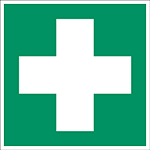Personal injury or rapid decline
Find out where the First Aid equipment is!
Burn/scald injuries
- Cool the area with plenty of running cold water for about 20–30 minutes.
- Do not leave the patient alone.
- Do not remove any of the patient’s clothes.
Eye injuries (splashes of corrosive substance)
- Rinse the eyes immediately with plenty of water.
- Keep the eyelid open while rinsing.
- Continue rinsing for about 20 minutes.
Corrosion injuries
- Immediately rinse the injured area with plenty of running water.
- Remove any clothes that have the corrosive substance on them.
- Continue rinsing the area for 20–30 minutes.
Electrical accidents
- Cut the power immediately.
- Do not touch the patient until the power has been cut.
Epilepsy
- Prevent the patient from hurting themselves, e.g. by cushioning their head.
- Do not put anything in the patient’s mouth – this can do more harm than good.
- Stay with the patient until the seizure has passed.
- If you witness a suspected epileptic seizure, check if the patient is wearing or carrying an epilepsy symbol before calling the emergency services. Most seizures pass within a few minutes.
Asthma
- Help the patient access and take their medicine, and loosen any tight-fitting clothes.
- If the seizure does not pass – call an ambulance.
Diabetes
- If the patient is conscious, give them something to eat or drink containing sugar.
- Wait 10–15 minutes to gauge their reaction. If the food or drink doesn’t help, the patient is in insulin shock.
- Never give an unconscious person anything to eat or drink.
Stroke/cerebral infarction/brain haemorrhage (symptoms)
- Sudden weakness or sudden numbness in the face, arms or legs, often – but not always – in one half of the body only.
- Sudden difficulty speaking or understanding, which can sometimes manifest as confusion.
- Sudden double vision or vision disorder in one or both eyes.
- Sudden difficulty walking, sudden dizziness, vertigo, or reduced balance and coordination.
- Sudden severe headache for no apparent reason.
The FAST test for stroke
If a person is unable to do the following, they may be having a stroke.
- F: Facial weakness – Can the person smile? Has their mouth or eye drooped?
- A: Arm weakness – Can the person raise both arms and keep them raised for 10 seconds?
- S: Speech problems – Can the person speak clearly and understand what you say?
- T: Time to call 112 if you see any of these signs.

